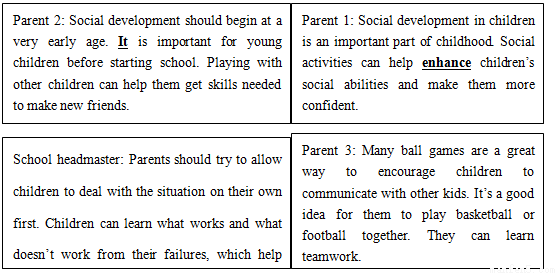题目内容
“Heaven (天堂) is where the police are English, the cooks are French, the mechanics are German, the lovers are Italian and everything is organized by the Swiss. Hell (地狱) is where the police are German, the cooks are English, the mechanics are French, the lovers are Swiss, and everything is organized by the Italians.”
Obviously the national stereotypes (模式化的思想) in this old joke are generalizations (普遍化), but such stereotypes are often said to “exist for a reason”. Is there actually a sliver (裂片) of truth in them? Not likely, an international research team now says.
“National and cultural stereotypes do play an important role in how people see themselves and others, and being aware that these are not dependable is a useful thing,” said study author Robert McCrae of the National Institute on Aging. “These are in fact unfounded stereotypes. They don’t come from looking around you,” McCrae said.
If national stereotypes aren’t rooted in real experiences, then where do they come from? One possibility is that they reflect national values, which may become known from historical events. For example, many historians have argued that the spirit of American individualism (个人主义) has its origins in the experiences of the pioneers on the Old West.
Social scientists such as psychologist Richard Robins have given several other possible explanations for stereotypes and why they may be incorrect. Robins notes that some stereotypes may have been correct at one point in history and then remained unchanged while the culture changed.
We may be “hard-wired”, to some degree, to keep incorrect stereotypes, since we are less likely to notice and remember information that is different from our stereotypes. Generally, according to Robins, when we meet people who are different from our stereotypes, we see them as unique individuals rather than typical national or cultural groups.
1.The stereotype about Italians is ________.
A. romantic but disorganized
B. friendly and good-tempered
C. dreamy and impractical
D. strict but thoughtful
2.National stereotypes are not always correct because ________.
A. they are formed by individual historians
B. what was true in the past may not be true at the present
C. generalizations are made through personal experience
D. people tend to have false idea about other cultures
3.According to the research team led by McCrae, national stereotypes are ________.
A. interestingB. harmfulC. humorousD. unreliable
4.The underlined word “hard-wired” in the last paragraph probably means ________.
A. forgetfulB. anxiousC. fixedD. helpless
 口算心算速算应用题系列答案
口算心算速算应用题系列答案 同步拓展阅读系列答案
同步拓展阅读系列答案

